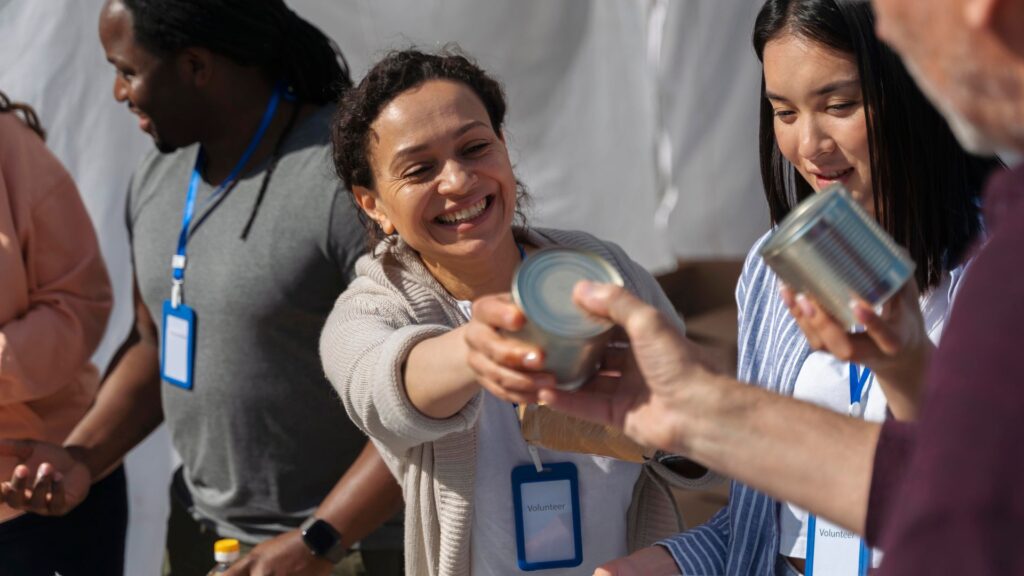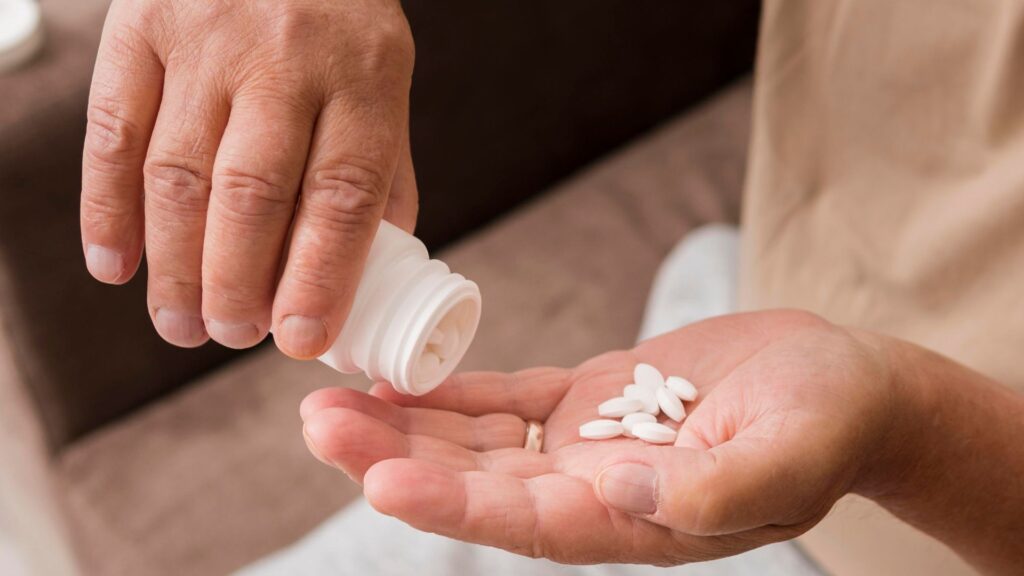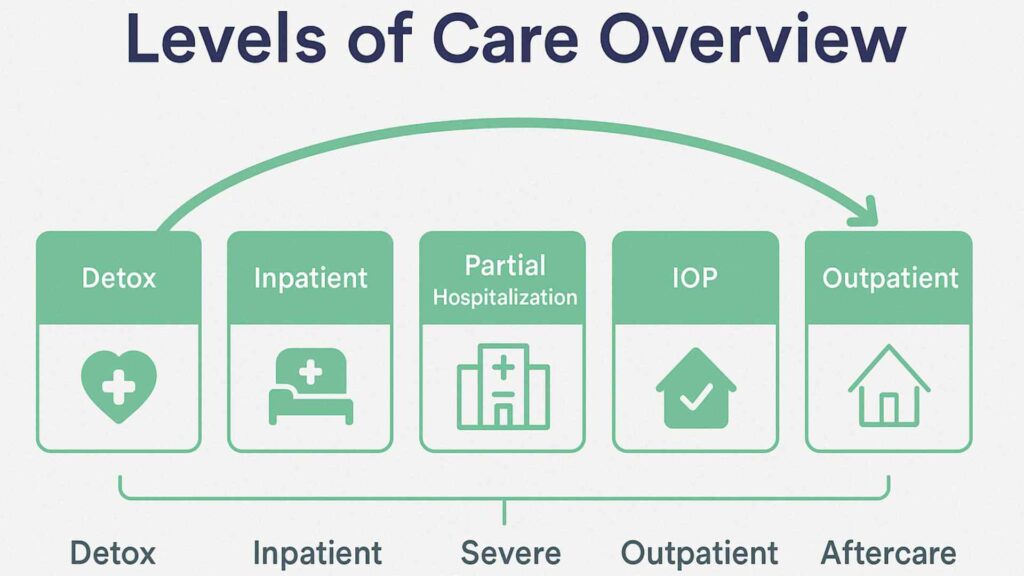Outpatient treatment and intensive outpatient programs (IOPs) are two common options within the spectrum of treatment for substance use disorders. While both provide support and therapy without requiring you to live at a facility, they differ in their intensity and time commitment to their treatment for substance abuse.
In this article, we’ll outline the key differences between these two forms of treatment and the factors one should take into consideration when choosing the right level of care.
What is an Outpatient Program?
An outpatient program is a part-time outpatient therapy or treatment program for substance use or mental health issues that lets you live at home and continue your daily activities. These outpatient treatment programs usually involve attending therapy sessions 1–3 times a week, which may include individual and group counseling, relapse prevention, and sometimes access to medical and psychiatric support as a form of treatment.
Outpatient services at addiction treatment centers may also offer life skills training, stress management, and standard outpatient therapy to address their mental health conditions.
They are best for people with mild substance abuse problems or as ongoing support after more intensive addiction treatment in a detox program, and can help individuals transition from inpatient rehab to independent living.
What is an Intensive Outpatient Program (IOP)?
Intensive outpatient programs provide a flexible yet structured treatment option for those dealing with substance use or mental health issues. With 9–19 hours of weekly counseling and therapy, these programs offer more support than standard outpatient care while allowing you to maintain work, school, or family responsibilities. IOPs typically include group and individual therapy to support your progress, skill-building, and sometimes holistic approaches like yoga or various forms of therapy. An IOP provides a course of treatment tailored to your needs, often used as a step-down from inpatient care, and designed to support long-term recovery with personalized plans and ongoing progress checks.
Key Differences Between Outpatient and Intensive Outpatient Programs
Level of Care and Intensity
- Outpatient Programs (OP) provide a lower intensity of care, best suited for individuals with mild to moderate substance use or mental health concerns who can manage their symptoms with minimal support.
- Intensive Outpatient Programs (IOP) deliver a higher level of care, designed for those with moderate to severe conditions or those needing more structure and support than OP but not requiring inpatient treatment.
Time Commitment and Scheduling
- OP typically involves 1–3 sessions per week, each lasting around 1–1.5 hours, resulting in a total commitment of about 3 hours weekly.
- IOP requires a greater time investment, often 3–5 days per week with sessions that require a few hours more, totaling 9–19 hours or more per week.
- The increased frequency and duration in IOP allow for more rapid progress and deeper exploration of underlying issues.
Structure and Therapeutic Components
- OP offers basic recovery services such as individual and group therapy sessions, educational classes, and sometimes integration of support groups like Twelve-Step programs.
- IOP is more structured, with scheduled group or individual therapy sessions, family counseling, and skills development, and often access to medical or psychiatric care.
- An IOP may include specialized therapies for substance abuse and mental health conditions (e.g., Cognitive Behavioral Therapy, Dialectical Behavior Therapy), holistic approaches (e.g., mindfulness, art therapy), and more comprehensive relapse prevention training.
Flexibility and Daily Life Integration
- Both OP and IOP allow participants to live at home and maintain daily responsibilities such as work, school, or family obligations.
- OP is generally more flexible, making it easier for individuals with significant external commitments to participate.
- IOP, while still allowing for outside responsibilities, requires more scheduling discipline and adherence to the program’s structure.
Role in the Treatment Continuum
- OP is often used as a first step for individuals with less severe issues or as ongoing support after higher levels of care.
- IOP commonly serves as a step down from inpatient or partial hospitalization, providing a bridge to independent living while maintaining substantial therapeutic support.
- IOP can also act as a primary treatment for those needing more than OP but less than inpatient care.
Cost Considerations
- OP generally costs less due to fewer therapy hours and less intensive resources.
- IOP, with its higher intensity and broader range of services, typically involves higher costs than standard OP.
Monitoring and Accountability
- OP provides basic monitoring, often relying on self-reporting and periodic check-ins.
- IOP offers increased accountability through frequent attendance, regular progress assessments, and more direct contact with treatment professionals.

Who Should Choose Which Program?
Outpatient programs are best suited for individuals with mild to moderate substance use disorders who are highly motivated for recovery, have a stable and supportive home environment, and can manage their daily routines and sobriety independently. These programs offer flexibility, allowing participants to continue working, attending school, or caring for family while receiving treatment, typically through one or two therapy sessions per week.
In contrast, IOPs are designed for those who require more structure and support than standard outpatient care but do not need 24-hour supervision. Ideal candidates for IOPs may be transitioning from inpatient or residential treatment, have moderate substance use or mental health concerns, or have experienced relapse and need a higher level of care.
The decision should be made in consultation with qualified professionals, taking into account the individual’s clinical needs, personal commitments, and support systems to ensure the best chance for sustained recovery.
Final Thoughts from Abundance Treatment
At Abundance Treatment, we offer personalized and compassionate evidence-based treatment options designed to meet the needs of both adults and adolescents. Whether it’s the flexibility of outpatient care or the structured support of our intensive outpatient program in Toledo, Ohio, our team can tailor the treatment plan to your circumstances and recovery goals.





































